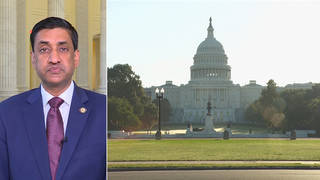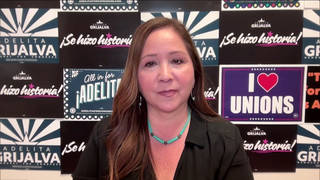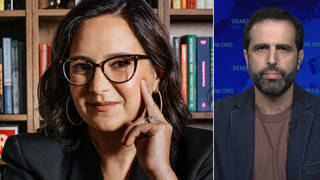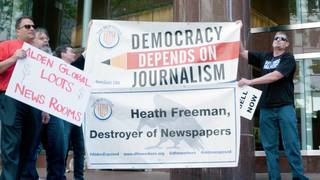
Guests
- Philip Zelikowserved as executive director of the 9/11 Commission. He is now professor of history and director of the Miller Center of Public Affairs at the University of Virginia.
Earlier in the week, we spoke to Philip Shenon, author of The Commission: The Uncensored History of the 9/11 Investigation. Shenon suggested that Philip Zelikow, the executive director of the 9/11 Commission, sought to minimize the Bush administration’s responsibility for failing to prevent the September 11th attacks. Shenon also revealed that Karl Rove repeatedly called Zelikow during the probe. Today Zelikow responds in his first broadcast interview since the publication of Shenon’s book. [includes rush transcript]
Transcript
JUAN GONZALEZ: I’d like to ask you, Philip Zelikow, on the issue of —- the book by Philip Shenon, The Commission: The Uncensored History of the 9/11 Investigation, raises obviously some disturbing criticism, in addition, about the Commission’s work. I was struck in particular by the questions he raised about your communications with Karl Rove during that period and also that the issue of whether you sought to have your secretary remove the logs of your phone calls with Karl Rove during that period. Could you respond to those issues raised bby Shenon?
PHILIP ZELIKOW: Well, not only can I respond to them, the commissioners actually have responded and will respond to anyone who asks them, because I was authorized by the Commission to talk to White House officials regularly, as was the general counsel, Dan Marcus. But on this business of Rove, it’s a little ironic, since I don’t even really know Rove. We had two brief contacts that had to do with University of Virginia business, because I used to direct a presidential research center. In both cases, we handed off the issues to others. The university actually has records on this matter. I told Shenon all of this.
The business about phone logs, actually two of the three people who took my calls don’t even remember the story. This appears to be a garble having to do with -—
AMY GOODMAN: Well, Philip Zelikow, then let’s ask —-
PHILIP ZELIKOW: —- whether the message slips would be left out on the counter. I mean, this —-
AMY GOODMAN: Well, let me ask you directly this very straightforward allegation of Philip Shenon, that he said that you called in your secretary, shut the door, informed her she was no longer to keep phone logs of your contacts with the White House. She got so alarmed that she -— thinking it was improper, that she went to the chief lawyer for the Commission to alert him about what’s happened. Did you tell her not to keep logs of your White House calls?
PHILIP ZELIKOW: Yes, well, if someone will just go talk to the chief lawyer of the Commission, you don’t have to rely on my account of this. I mean, there other people who have knowledge of these facts. And there’s no there there.
AMY GOODMAN: And so, you’re saying you did not tell her?
PHILIP ZELIKOW: This is a —-
AMY GOODMAN: You did not tell her not to keep logs.
PHILIP ZELIKOW: There are no phone logs for the Commission. There are no phone -— the Commission had no phone logs. So I couldn’t tell her not to keep logs in a situation where the Commission didn’t have phone logs.
AMY GOODMAN: But she kept your logs.
PHILIP ZELIKOW: I mean, this is — I mean —-
AMY GOODMAN: She kept your logs.
PHILIP ZELIKOW: No, I did not have any phone logs.
AMY GOODMAN: So you’re saying you did not -— this is a completely fabricated story?
PHILIP ZELIKOW: I did not have phone logs. This is a garble of something that’s probably come second — you know, two or three layers removed from people who don’t actually understand the way our office worked. But no one in the office thought that I was concealing anything from the commissioners, and the commissioners don’t think I was concealing anything from them, because they were briefed on all these contacts.
And they also knew very well what my relationship with the White House was, since, as the commissioners have recently put it, Zelikow was the White House’s biggest problem. And they, the commissioners, if you will just call them and ask them, will point out that I was actually a source of constant trouble for the White House, and the White House had hoped that the Commission would put someone else in my job. And in fact, the White House’s biggest supporters, like Bill Safire, were slamming me in their columns during 2004, because I was leading the Commission to knock down the theories they supported. So it’s —- I think this -—
JUAN GONZALEZ: There appears to be, at least according to Shenon, one commissioner, Mr. Zelikow, Max Cleland, who did raise questions about what was happening on the Commission, and he was removed, according to Shenon, because of his — or shortly after raising his criticisms of what he thought were cover-ups occurring in the Commission. He was removed. Is there any accuracy to that Shenon claim?
PHILIP ZELIKOW: He was not removed. Max resigned from the Commission. There are commissioners who know very well the circumstances of Max’s resignation. And if anyone wants to know more about this, he should talk to either Max or Tom Daschle or the commissioners involved, because Max resigned on his own and quite voluntarily for very personal reasons that commissioners know about, but which I was not a part of at all.
AMY GOODMAN: One of the points that Philip Shenon makes in his book, The Commission, is not only your relationship — your ongoing relationship with Rove, but with Condoleezza Rice, which went way back before the Commission, of course, that you co-authored a book with her.
PHILIP ZELIKOW: May I just stop you, though? When you say my “ongoing relationship with Karl Rove,” I had no ongoing relationship with Karl Rove. I’ve never worked with Karl Rove. I’ve never had any political dealings with Karl Rove at all in my life. So this is — your question just kind of assumes things that just aren’t true.
AMY GOODMAN: He talks about —-
PHILIP ZELIKOW: Now, I have had a relationship with Condi Rice, sure.
AMY GOODMAN: —- conversations that you had with Karl Rove at the White House and also a longtime relationship with Condoleezza Rice and talks about —-
PHILIP ZELIKOW: Sure.
AMY GOODMAN: In the book, he talks about how the staff felt pressured and that any negative references to Condoleezza Rice in her role in the lead-up to the 9/11 attacks was whitewashed in the report, because of pressure from you, her friend, her co-author, longtime colleague.
PHILIP ZELIKOW: But, you know, Shenon doesn’t say that.
AMY GOODMAN: Well, he does argue -—
PHILIP ZELIKOW: Shenon doesn’t say the report was — excuse me, Shenon does not say the report was “whitewashed,” quote/unquote, in any way at all.
AMY GOODMAN: Well, let me say that he talks about the pressure that high-level staffers felt when talking — when writing about Condoleezza Rice.
PHILIP ZELIKOW: Oh. Well, why don’t you — you or any journalist should call up the high-level staffers and ask them. And ask them whether or not they felt that they were bullied or pressured. The leader of that team, who worked in the Clinton White House, I’ll add, has gone on the record with the Associated Press saying that their team did not feel bullied in any way at all. He is happy to talk to any reporter about this. Another member of the staff who plays a very prominent role in Shenon’s account wrote to all the commissioners, reached out to all of them, and described Shenon’s account as, quote, “a case study in hype,” close quote. But journalists — so journalists who want to check this out, go talk to them. You don’t have to take my word for it. Go ask them if they felt pressured.
Of course, the irony in all of this was, at the time, the White House’s supporters were denouncing me, and here, three-and-a-half years later, I’m being attacked from the other side. The commissioners themselves don’t feel that they were —- the commissioners feel that they understood exactly how I was running the Commission staff and how I was doing the work. They had transparency into what was going on. And I think they can speak for themselves now on the final product. But Shenon never alleges -—
AMY GOODMAN: What Shenon argues, what he argues —-
PHILIP ZELIKOW: —- that any key facts were left out of the report.
AMY GOODMAN: What he argues is that you sought to intimidate staff to avoid damaging findings for President Bush, who at the time was running for reelection, as well as references to Condoleezza Rice in any damaging way.
PHILIP ZELIKOW: He — you’re saying he says “sought to intimidate,” quote/unquote?
AMY GOODMAN: Yes.
PHILIP ZELIKOW: I don’t think so.
AMY GOODMAN: This is what Shenon alleges in The Commission, in his new book.
PHILIP ZELIKOW: Well, as I — I mean, anyone who was in the White House at the time would find that accusation ridiculous. But, as I say, talk to the staffers. Ask them. Ask them if they thought that I was trying to intimidate them. The leader of the team is happy to talk to any reporters who will ask. So what I’m trying to do is, I don’t want to get into an argument where I’m saying, you know, Shenon says this, Zelikow says that. You don’t have to trust me or take my word for it. Go to the commissioners, go to the staffers, many of whom worked for Democratic administrations. I worked for one month on a transition team. Our general counsel had been the number three person in Janet Reno’s Justice Department.
AMY GOODMAN: Philip Zelikow, we’re going to have to leave it there, because we’re at the end of the broadcast, but I want to thank you for being with us, executive director of the 9/11 Commission, former executive director, now professor at University of Virginia. Robert Windrem of NBC News, and Michael Ratner, president of the Center for Constitutional Rights.












Media Options